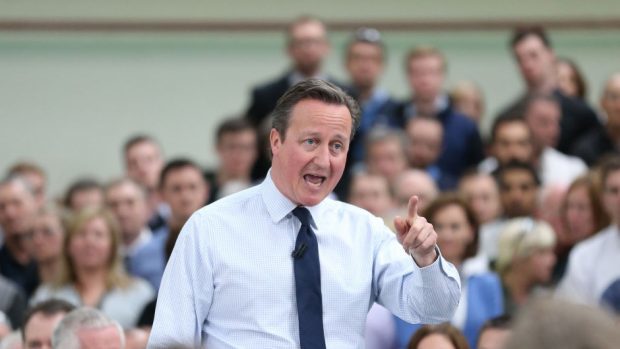The farming sector contributes £9.9billion to the UK economy and employs almost half a million people. It matters to Britain and it matters particularly to areas like the north-east of Scotland where agriculture dominates.
And so, at a time when we face a fundamental question about the future of our country – like whether or not we should remain a member of the European Union – farmers are a group of people to whom we should listen carefully.
Last month, the National Farmers Union of England and Wales made its position clear, that the interests of British farmers are best served by our continuing membership.
But, as so often, Scotland was ahead of the game on this. NFU Scotland confirmed its backing for a remain vote back in February, pointing to public support through the Common Agricultural Policy and access to the European single market.
As intense debate takes place the length and breadth of the UK, one might wonder why our two major farming unions have reached such definitive positions. A simple look at the figures provides some obvious answers.
The Scottish farming and food and drink manufacturing industry exported £2.2billion worth of products to the EU in 2014 – 39% of total Scottish food and drink exports. As NFU Scotland points out, these exports benefited from facing no tariffs whatsoever.
If we leave the EU, and our farmers instead have to operate under World Trade Organisation rules, we can expect a very different picture. Farmers could be faced with tariffs on their exports – some as high as 70%- as well as huge additional costs.
Importantly, we would also lose the protected status enjoyed across Europe by unique Scottish products. This would create major difficulties for Scottish exporters of a whole range of products including wild and farmed salmon, lamb, beef, traditional cheeses and meat products such as Stornoway black pudding – as well as, of course, Arbroath Smokies.
And just this week, the Scotch Whisky Association warned that more than £1billion worth of Scotch whisky exports could be at risk. They said the European single market is “central to the success of Scotch” and many of the jobs the industry supports.
But it is not just farming and the food and drink industry which would be hit by a decision to leave the EU.
Respected organisations including the International Monetary Fund, the Organisation for Economic Co-operation and Development, the Confederation of British Industry and big employers across Scotland and the whole of the UK are all agreed that the shocks would be widespread.
Indeed, it is highly unusual in being an issue which unites Ruth Davidson and I with Nicola Sturgeon, Kezia Dugdale, Willie Rennie and others from across the political spectrum. We may differ elsewhere on the best path for Scotland’s successful future, but we’re all agreed we will be stronger, safer and better-off as part of a reformed EU than out on our own.
At a time when there is much discussion about how Holyrood will use its new fiscal powers, do we really want a situation where tax receipts drop by the equivalent of an extra 8p on the basic rate of income tax? Because that is what the latest Treasury analysis shows is the most likely outcome of us leaving the EU. Not to mention the prospect of UK households being an average £4,300 a year worse off because of the impact on trade and investment.
As a proud supporter of the union, my love for this UK and its constituent nations should not be in any doubt. And I recognise the frustrating aspects of the EU that sometimes wind us all up.
But it’s because I love Britain that I want it to succeed, now and in decades to come. I want families to enjoy the best living standards possible and I want our children to be able to leave school and pursue the careers they aspire to. That’s why I want us to stay in the EU, drive its reform, and make it work best for us.
More than three million jobs in the UK are directly linked to our place in Europe and I don’t want us to lose a single one of them.
Staying in the EU means British businesses will continue to have full access to the single market, a deal much better than anything we could ever negotiate from outside. Vote Leave say they’ll walk away from the single market and negotiate a new deal, but they can’t explain what it would be and how long it would take.
The reality is that, if we left, the EU would not give us a better deal than they have for themselves. So a vote to leave means jobs lost, prices up, mortgages at risk and funding for your local school or hospital down.
I don’t believe that’s a risk worth taking. That is why I call on everyone -whatever their political outlook – to vote for economic security, a safer country, and a brighter future for our children, and choose to stay in on June 23. The alternative is a leap into the dark and years of uncertainty.
